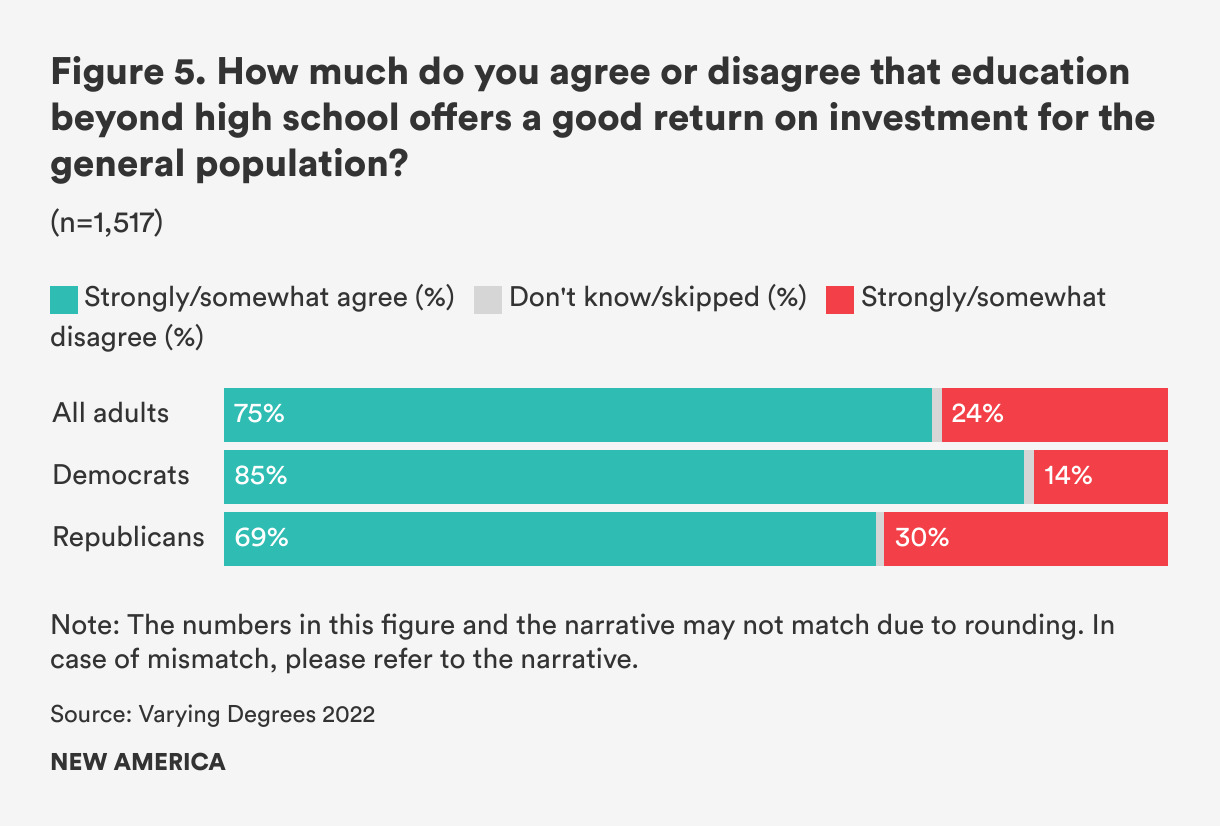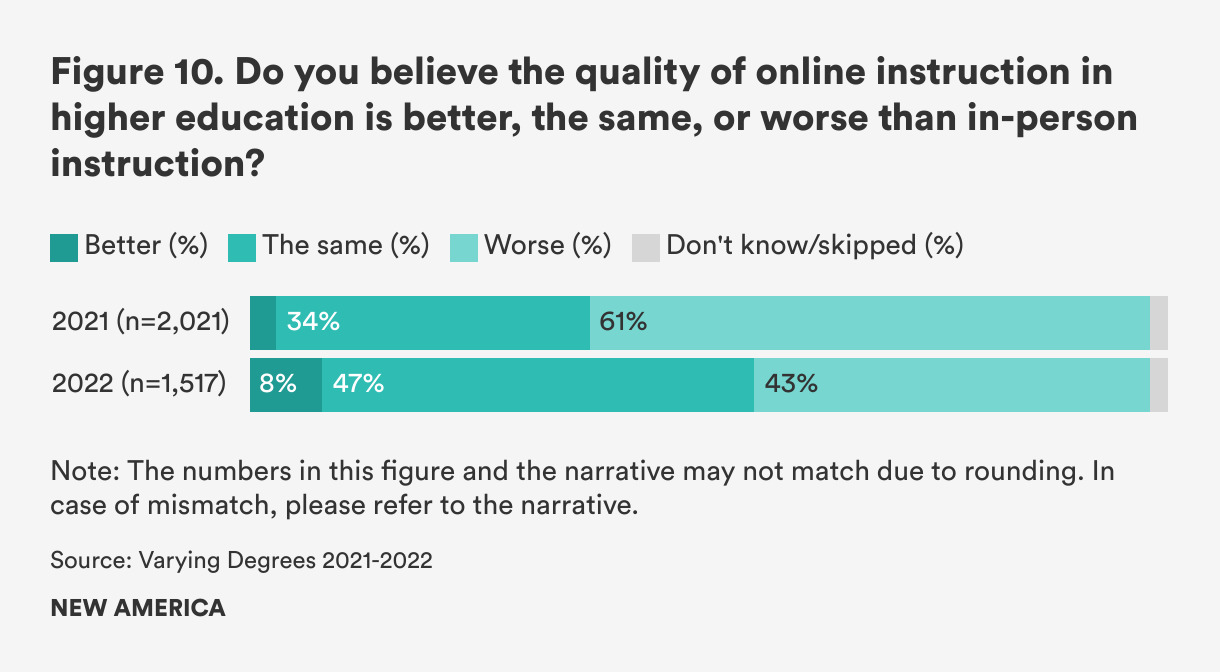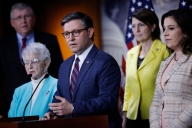You have /5 articles left.
Sign up for a free account or log in.

Three-fourths of respondents agreed that college is a good return on investment, but that number has fallen—especially among Republicans.
SDI Productions/E+/Getty Images
While Americans continue to believe in the overall value of higher education, the share who say that colleges and universities are having a positive effect “on the way things are going in this country today” has declined by 14 percentage points since 2020, according to a new survey from New America.
“Varying Degrees 2022,” the think tank’s sixth annual survey on higher education, reflects the unease and doubt wrought by nearly three years of the global COVID-19 pandemic, not to mention geopolitical instability and a volatile economy. Only 55 percent of respondents agreed that institutions of higher education were having a positive impact on the country (42 percent said it was negative), compared to 58 percent last year and 69 percent in early 2020, just before the start of the pandemic.
“We were actually very nervous to see what the numbers would be like,” said Sophie Nguyen, a senior policy analyst in New America’s education policy program and co-author of the report. “Especially since the pandemic, there’s just been a lot of uncertainty that might affect Americans’ opinions of all social issues—not just higher education.”
But in many ways, she said, the trends have held fairly steady, at least on questions posed year after year regarding the value of higher education, who should fund it and who should be held accountable when it falls short.
“The results of this year’s survey show that even though the future remains uncertain and positive feelings about higher education have waned a bit, Americans still value higher education overall and believe that it will help their children, and the nation, secure economic success,” reads the preface to the report. “For this reason, they believe that opportunities after high school should be well funded by state and federal governments, and that schools which receive federal dollars must be held accountable.”
 About three-fourths of respondents agreed that postsecondary education offers a good return on investment, down from 80 percent in 2020. Yet the partisan divide widened, with 85 percent of Democrats and 69 percent of Republicans viewing it as a good investment, compared to 78 percent of Democrats and 82 percent of Republicans two years ago.
About three-fourths of respondents agreed that postsecondary education offers a good return on investment, down from 80 percent in 2020. Yet the partisan divide widened, with 85 percent of Democrats and 69 percent of Republicans viewing it as a good investment, compared to 78 percent of Democrats and 82 percent of Republicans two years ago.
Political differences were even sharper over who should fund higher education. Seventy-seven percent of Democrats but only 36 percent of Republicans agreed the government should pay for students to go to college “because it is good for society.” Conversely, 63 percent of Republicans and 22 percent of Democrats agreed that students should be financially responsible for their educations “because they personally benefit.”
In terms of what types of institutions warrant the cost, 81 percent of respondents said public community colleges were worth it, compared to 67 percent for both public four-year institutions and minority-serving institutions, 53 percent for private nonprofits, and 41 percent for for-profits. Democrats and Republicans were generally aligned on the question—except concerning MSIs, which 80 percent of Democrats but only 54 percent of Republicans agreed were worth the cost.
Respondents overwhelmingly agreed (93 percent) that colleges and universities should provide the public with data on key performance indicators, such as graduation or employment rates, and that they should lose access to government funding if they miss their benchmarks. More than three-fourths said institutions should lose funding for low graduation rates, and 70 percent said they should be denied if they post a high rate of student loan debt relative to earnings.
“The ‘Varying Degrees’ report is important as it helps pinpoint public perceptions about the value of a postsecondary education—something we all need a pulse check on as we continue to live and learn through a pandemic,” Michael Itzkowitz, a senior fellow at the think tank Third Way, wrote in an email. “What’s interesting is that a lot of the perceptions match reality. For example, about three-quarters of Americans see higher education as a good investment. Within my work, I can also see many schools offering a quick economic return for students. However, and perhaps reflective of the 24 percent that view higher education as a losing proposition, there are too many schools that continuously offer a poor return for the majority of students who enroll. The Varying Degrees report shows that most Americans want to hold institutions accountable for poor results, and I don’t disagree.”
The report, funded by the Bill & Melinda Gates Foundation, surveyed 1,157 Americans 18 and older in April and May of this year.
Widespread Zoom fatigue notwithstanding, opinions of online education have notably improved, the survey found: 8 percent of respondents—and 17 percent of current students—said they think the quality of online instruction is better than in-person instruction, compared to 3 percent who felt that way in 2021. And 47 percent agreed that the quality is equivalent to that of in-person instruction, compared to 34 percent last year.
of current students—said they think the quality of online instruction is better than in-person instruction, compared to 3 percent who felt that way in 2021. And 47 percent agreed that the quality is equivalent to that of in-person instruction, compared to 34 percent last year.
That’s not necessarily good news, said Nguyen.
“When we look at it from an accountability perspective, it’s actually a data point that’s more concerning than positive,” she said. “Historically, the for-profit colleges, which offer predominantly online education, are the ones that engage in predatory recruitment that has misled students and produced worse outcomes.”
If students get too comfortable with online learning, she said, it could make it easier for for-profit institutions to take advantage of them.
Regardless of their views on the quality of online education, 80 percent of respondents agreed it should cost less than in-person education.
Given the rise in test-optional admissions, the “Varying Degrees” survey added several questions in this year’s survey about standardized testing. Only 6 percent of respondents agreed that SAT/ACT test scores should be required and used as a key indicator of student preparedness; 38 percent said they should be required and used in combination with grades and other measures, and 42 percent said they should be optional and used as one of several metrics. Eleven percent said tests should not be allowed.
But the age disparity among respondents was striking: while 60 percent of Gen Z respondents favored test-optional policies, only 35 percent of baby boomers did. And while a majority of boomers (53 percent) supported testing mandates, fewer than a quarter of Zoomers did.
Nguyen, who also researches student success, said the younger generations are much less likely than older ones to feel like they have adequate support services in college, ranging from financial aid to career counseling to basic needs support.
“A majority of Americans think that colleges and universities provide enough support in most of these areas,” she said. “But when you look at the responses from Gen Z and millennials—especially for Gen Z—it’s just much lower. And it’s concerning because they are the ones who are experiencing it right now, and if they say they don’t feel that colleges and universities provide enough support in these areas, that is telling. It shows that we need to look at the data more to see what is actually happening on the ground and why that’s the case.”





